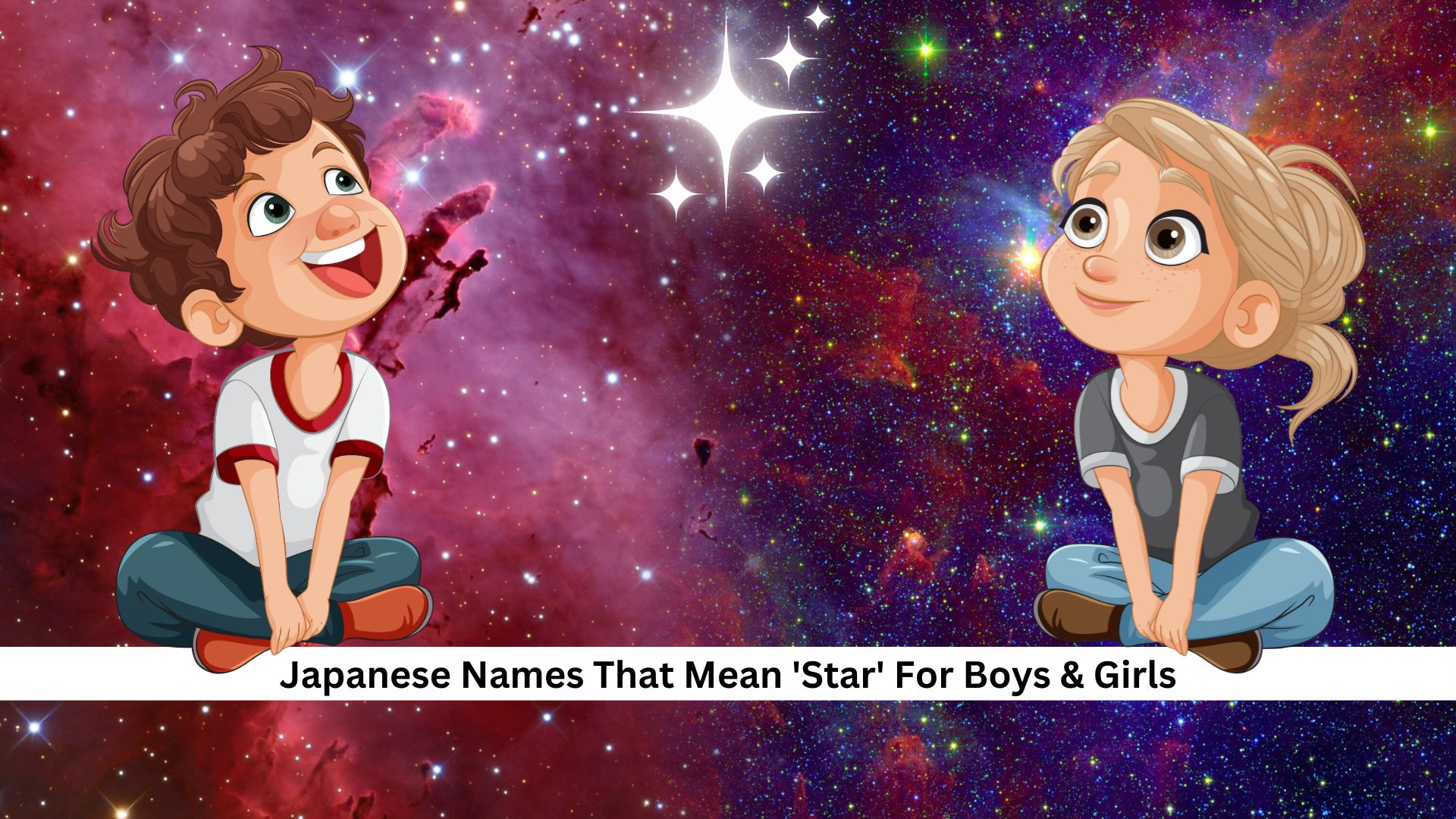When we look at Japanese names that mean ‘star,’ we find a deep connection between culture, language, and what parents hope for their children. These 125 star-themed names for boys and girls show us something about family hopes and cultural identity. It’s interesting to think about how these names shape the lives and interactions of the people who have them. What does this tell us about how society in Japan views stars and the sky? It’s a big part of their stories and values.
Japanese Names That Mean ‘Star’ for Boys
In Japanese culture, the stars are deeply admired, and this is reflected in the names given to boys. Names like Seiran, which means ‘Star orchid,’ capture both beauty and grace. It shows how much aesthetics matter in Japanese traditions. Then there’s Amaboshi, meaning ‘Heavenly star.’ This name is all about the beauty of the skies and the high hopes parents have for their children. Kisei, which means ‘Shining star,’ is perfect for a boy seen as a bright light in his family.
- Hoshi (星) – “Star”: Directly translates to “star,” symbolizing the bright celestial bodies in the night sky.
- Hoshiro (星朗) – “Bright star”: Combines “hoshi” (star) and “ro” (bright), indicating a shining star.
- Seiza (星座) – “Constellation”: Refers to a group of stars forming a recognizable pattern.
- Staru (スター) – “Star” (stylized English origin): A stylized version of the English word “star,” adapted into Japanese.
- Hoshiko (星子) – “Child of stars”: “Hoshi” (star) and “ko” (child) together mean a child of the stars.
- Hoshito (星人) – “Star person”: Combines “hoshi” (star) and “to” (person), implying someone connected to stars.
- Hoshikage (星影) – “Star shadow”: “Hoshi” (star) and “kage” (shadow) create a poetic image of a star’s shadow.
- Seizaru (星座瑠) – “Auspicious star”: “Sei” (auspicious) and “za” (star) together signify a fortunate star.
- Hoshin (星心) – “Benevolent star”: “Hoshi” (star) and “shin” (benevolent) indicate a kind and helpful star.
- Staruto (スタールト) – “Star” (inspired by English): Another stylized version of the English word “star,” adapted into Japanese.
- Hoshiya (星夜) – “Star night”: Combines “hoshi” (star) and “ya” (night), referring to a night full of stars.
- Seizato (星人) – “Star person” (alternate kanji): Another form of “Hoshito,” using different kanji characters.
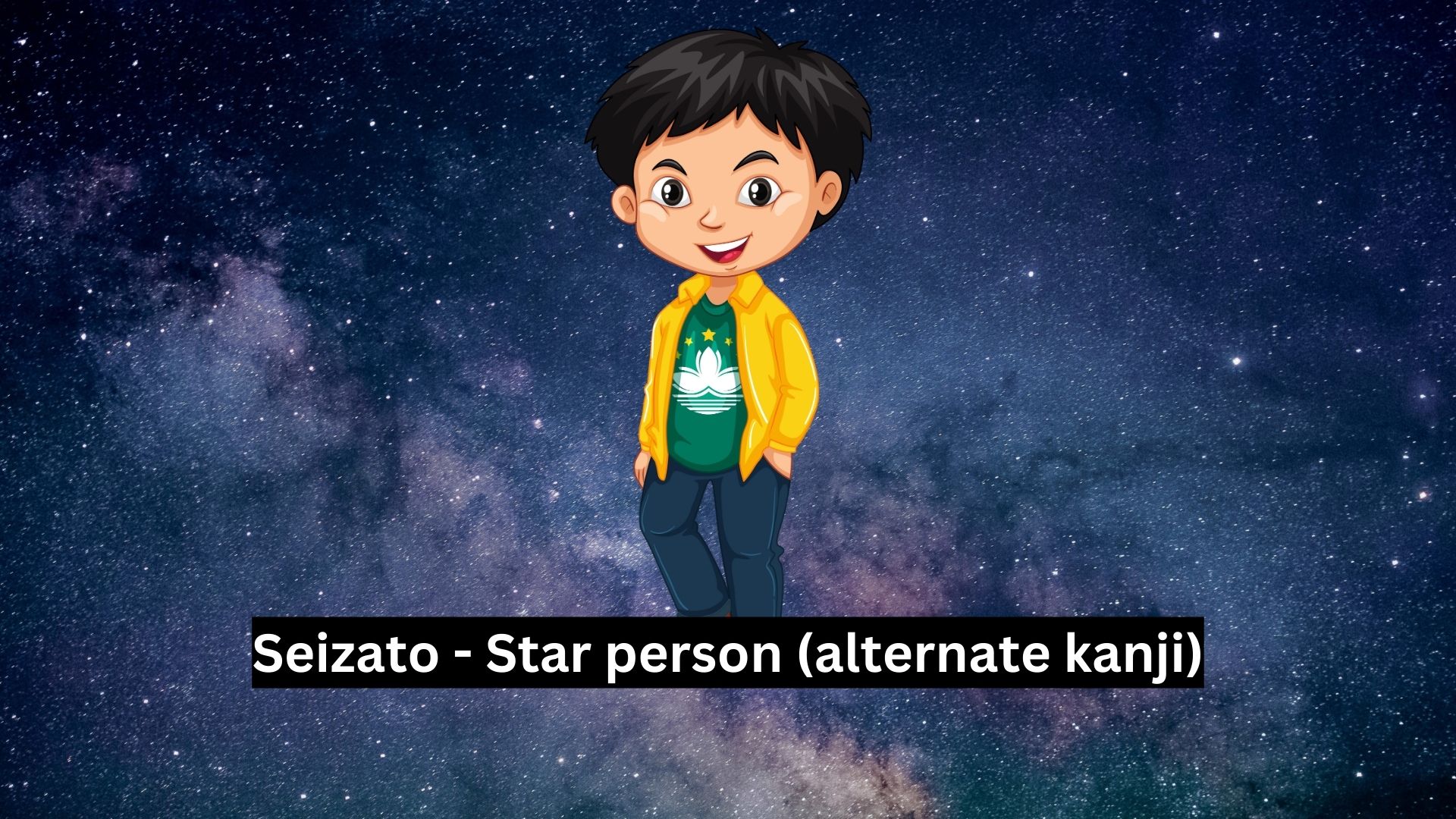
- Hoshiki (星希) – “Hope star”: “Hoshi” (star) and “ki” (hope) together symbolize a star of hope.
- Seizan (星山) – “Mountain star”: “Sei” (star) and “zan” (mountain) indicate a star seen over a mountain.
- Hoshizora (星空) – “Starry sky”: “Hoshi” (star) and “Zora” (sky) mean a sky filled with stars.
- Seizaki (星崎) – “Cape of stars”: “Sei” (star) and “Zaki” (cape) imply a place surrounded by stars.
- Hoshitaka (星高) – “Tall star”: “Hoshi” (star) and “taka” (tall) indicate a high or prominent star.
- Seizamaru (星丸) – “Round star”: “Sei” (star) and “maru” (round) suggest a round or complete star.
- Hoshimaru (星丸) – “Round star” (alternate kanji): Another form of “Seizamaru,” using different kanji characters.
- Seizakiyo (星清) – “Pure star”: “Sei” (star) and “kiyo” (pure) together signify a pure and bright star.
- Hoshirou (星郎) – “Son of stars”: “Hoshi” (star) and “rou” (son) imply someone who belongs to the stars.
- Seizashin (星新) – “New star”: “Sei” (star) and “shin” (new) together mean a newly discovered star.
- Hoshinari (星成) – “Star formation”: “Hoshi” (star) and “nari” (formation) indicate a cluster or formation of stars.
- Seizashi (星志) – “Star ambition”: “Sei” (star) and “shi” (ambition) together symbolize a star with high aspirations.
- Hoshisuke (星助) – “Star helper”: “Hoshi” (star) and “suke” (helper) imply someone who is a guiding star.
- Seizasuke (星助) – “Star helper” (alternate kanji): Another form of “Hoshisuke,” using different kanji characters.
- Hoshihide (星英) – “Excellent star”: “Hoshi” (star) and “hide” (excellent) together mean an outstanding star.
- Seizahide (星英) – “Heroic star”: “Sei” (star) and “hide” (heroic) signify a star with heroic qualities.
- Hoshiriku (星陸) – “Land of stars”: “Hoshi” (star) and “Riku” (land) together indicate a place full of stars.
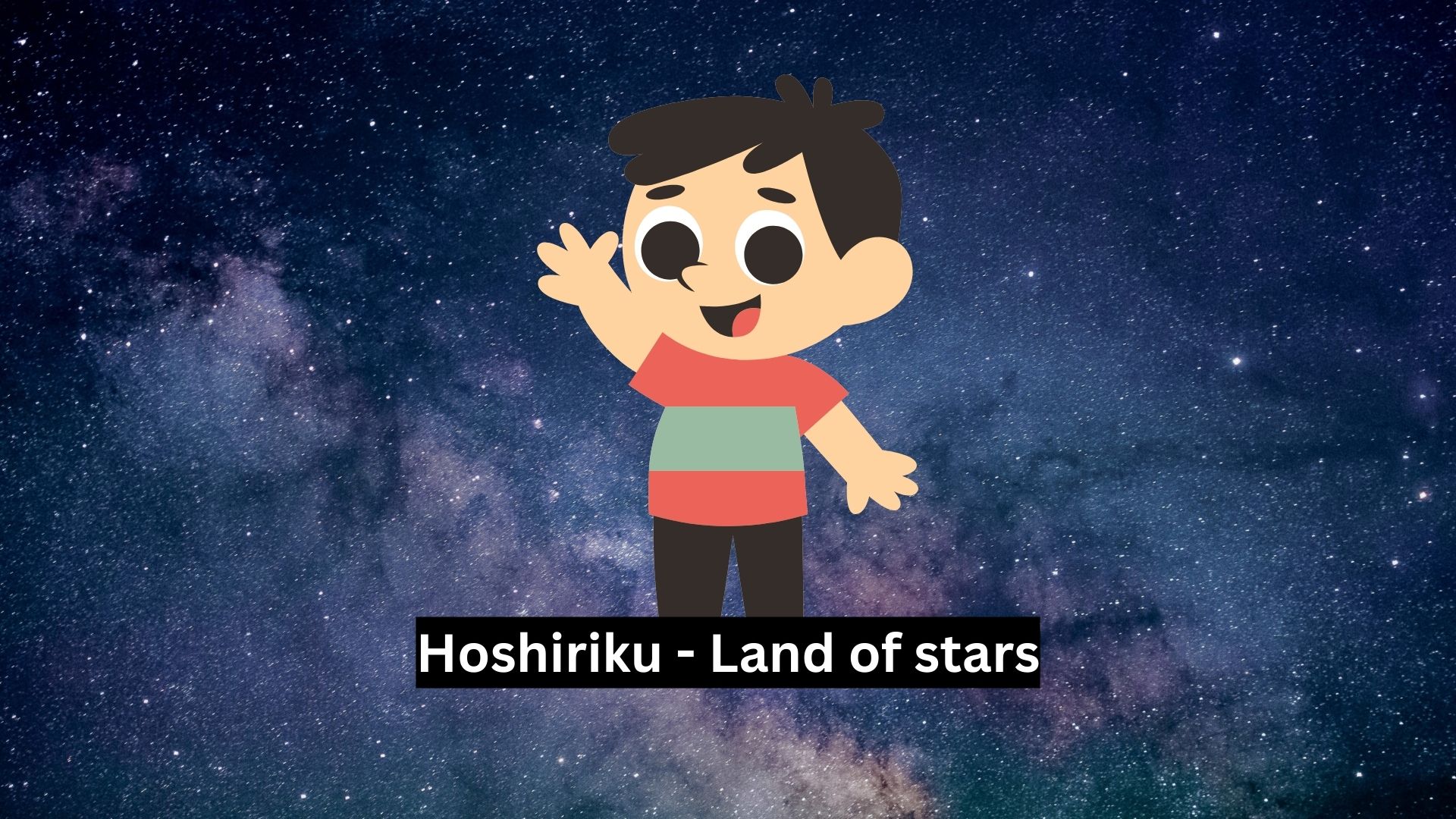
- Seizariku (星陸) – “Land of stars” (alternate kanji): Another form of “Hoshiriku,” using different kanji characters.
- Hoshifumi (星文) – “Literary star”: “Hoshi” (star) and “fumi” (literary) together mean a star associated with literature.
- Seizafumi (星文) – “Historic star”: “Sei” (star) and “fumi” (historic) imply a star with historical significance.
- Hoshimichi (星道) – “Star path”: “Hoshi” (star) and “Michi” (path) together symbolize a path of stars.
- Seizamichi (星道) – “Star path” (alternate kanji): Another form of “Hoshimichi,” using different kanji characters.
- Hoshiaki (星明) – “Bright star”: “Hoshi” (star) and “aki” (bright) together mean a luminous star.
- Seizaaki (星明) – “Bright star” (alternate kanji): Another form of “Hoshiaki,” using different kanji characters.
- Hoshitomo (星友) – “Friend star”: “Hoshi” (star) and “tomo” (friend) together signify a friendly or companion star.
- Seizatomo (星友) – “Friend star” (alternate kanji): Another form of “Hoshitomo,” using different kanji characters.
- Hoshihiro (星広) – “Wide star”: “Hoshi” (star) and “Hiro” (wide) together indicate a star that covers a large area.
- Seizahiro (星広) – “Great star”: “Sei” (star) and “Hiro” (great) together mean an impressive or large star.
- Hoshikazu (星一) – “One star”: “Hoshi” (star) and “Kazu” (one) together signify a singular or unique star.
- Seizakazu (星数) – “Number of stars”: “Sei” (star) and “Kazu” (number) indicate a multitude of stars.
- Hoshino (星野) – “Field of stars”: “Hoshi” (star) and “no” (field) together symbolize a field filled with stars.
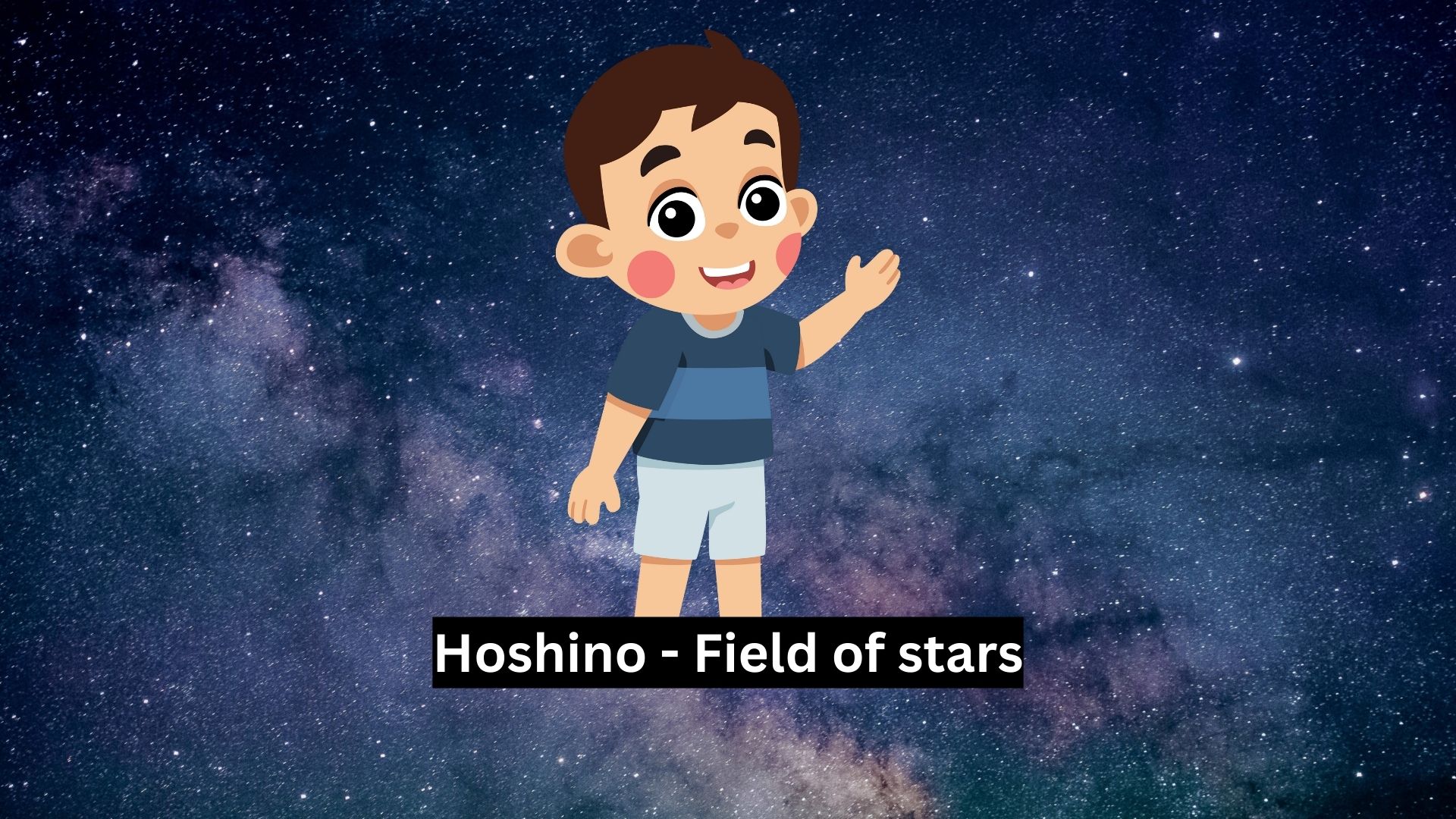
- Seizano (星野) – “Field of stars” (alternate kanji): Another form of “Hoshino,” using different kanji characters.
- Hoshitada (星忠) – “Loyal star”: “Hoshi” (star) and “tada” (loyal) together signify a faithful or dependable star.
- Seizatada (星忠) – “Loyal star” (alternate kanji): Another form of “Hoshitada,” using different kanji characters.
- Hoshitake (星健) – “Healthy star”: “Hoshi” (star) and “take” (healthy) together indicate a robust or vigorous star.
- Seizatake (星岳) – “Mountainous star”: “Sei” (star) and “take” (mountainous) imply a star associated with mountains.
- Hoshiyuki (星雪) – “This star”: “Hoshi” (star) and “yuki” (this) together signify a specific or notable star.
- Seizayuki (星雪) – “Lucky star”: “Sei” (star) and “yuki” (lucky) together mean a star that brings good fortune.
- Hoshimune (星宗) – “Star creed”: “Hoshi” (star) and “mune” (creed) together symbolize a star with a strong belief system.
- Seizamune (星宗) – “Star creed” (alternate kanji): Another form of “Hoshimune,” using different kanji characters.
- Hoshitane (星種) – “Seed of stars”: “Hoshi” (star) and “tane” (seed) together signify the origin or potential of stars.
- Seizatane (星種) – “Seed of stars” (alternate kanji): Another form of “Hoshitane,” using different kanji characters.
- Hoshikage (星影) – Star shadow (alternate reading): Another reading of “Hoshikage,” symbolizing the poetic image of a star’s shadow.
Also Read: 50+ Japanese Names That Mean Ice For Boys & Girls
Japanese Names That Mean ‘Star’ for Girls
In Japanese culture, girls often receive names linked to stars and the sky. These names, like Hoshiko (‘star child’) and Seika (‘star flower’), reflect the beauty of the night and the hopes parents have for their daughters. Names such as Hikari (‘light’) capture the bright and guiding nature of stars. Other names like Amane (‘sound of the heavens’) and Sora (‘sky’) show a deep bond with the cosmos, underlining balance and endless possibilities. These names not only connect children to their heritage but also to the vast universe.’
- Hoshi (星) – Star: Directly translates to “star,” symbolizing the bright celestial bodies in the night sky.
- Akari (明かり) – Light, brightness: Signifies light or brightness, like the illumination provided by stars.
- Seren (セレン) – Serenity, calmness (borrowed from Welsh, used in Japan): Echoes the peacefulness of a starry night.
- Yozora (夜空) – Night sky: Means “night sky,” the canvas where stars reside.
- Hikari (光) – Light, radiance: Represents light and radiance, much like the glow of stars.
- Aster (アスター) – Star (from Greek, used in Japan): Means “star” in Greek, symbolizing a bright, celestial body.
- Lumi (ルミ) – Snow (Finnish origin, associated with starlight in Japan): Associated with the purity and sparkle of starlight in Japan.
- Nozomi (望み) – Hope, wish: Means hope or wish, often associated with wishing upon a star.
- Kaede (楓) – Maple (associated with star-shaped leaves): Means maple, whose leaves are star-shaped.
- Mei (明) – Bright, beautiful: Signifies brightness and beauty, akin to a shining star.
- Yuki (雪) – Snow, happiness: Means snow or happiness, evoking the image of snowflakes glittering like stars.
- Astra (アストラ) – Of the stars (Latin origin, used in Japan): Means “of the stars” in Latin, highlighting a celestial connection.
- Stella (ステラ) – Star (Latin origin, used in Japan): Translates to “star” in Latin, symbolizing a bright celestial body.
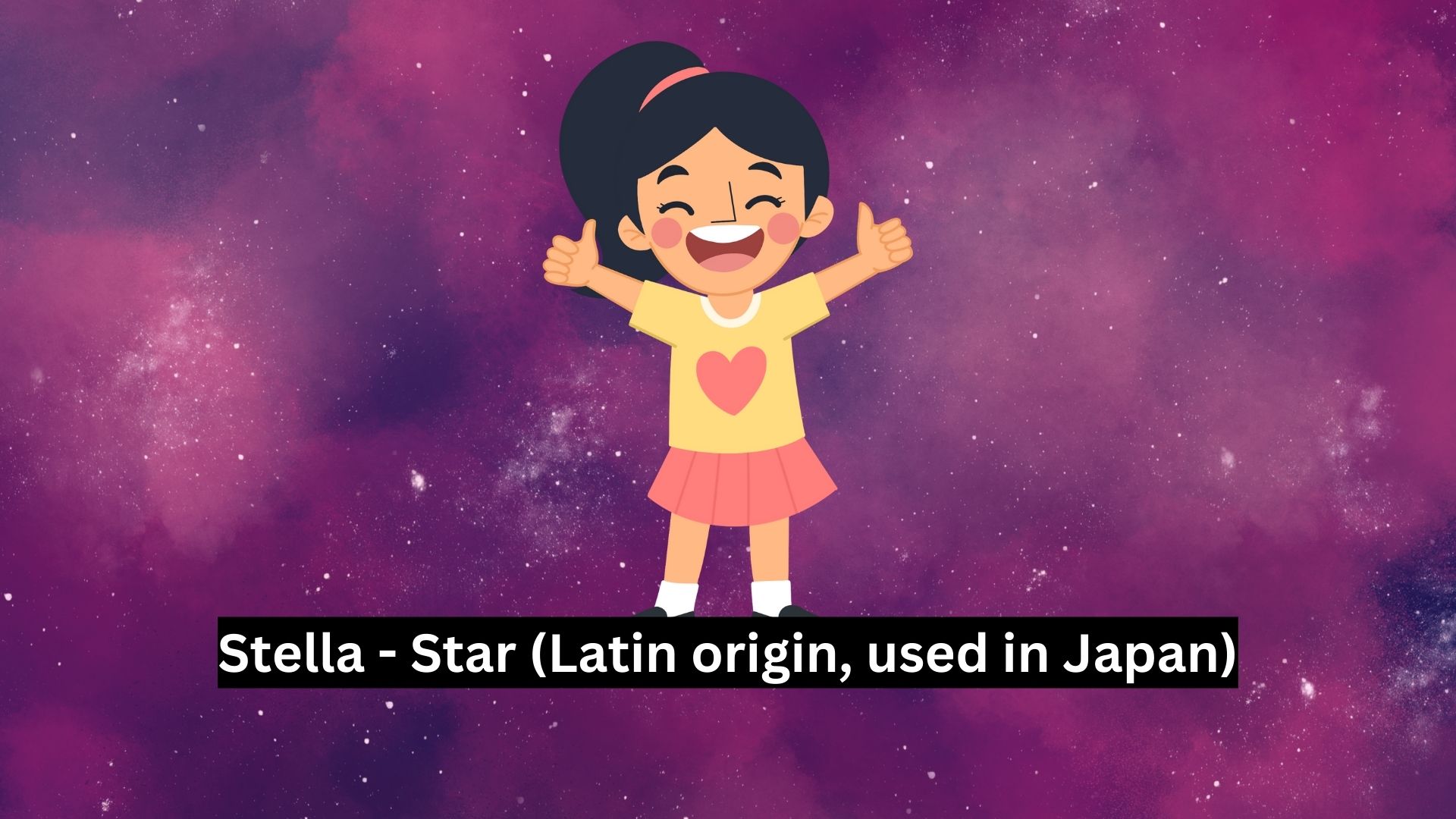
- Kira (キラ) – Glitter, sparkle: Means glitter or sparkle, reminiscent of twinkling stars.
- Hoshiko (星子) – Star child: Combines “hoshi” (star) and “ko” (child), meaning “child of the stars.”
- Myōjō (明星) – Morning star, Venus: Refers to the morning star, Venus, which shines brightly at dawn.
- Mirai (未来) – Future: Means future, symbolizing hope and aspirations like looking towards the stars.
- Sora (空) – Sky: Means sky, the vast expanse where stars are found.
- Yume (夢) – Dream: Means dream, evoking the wonder and imagination inspired by stars.
- Aoi (青) – Blue (like the sky): Means blue, reflecting the color of the sky that houses the stars.
- Rin (凛) – Dignified, severe, cold (like stars): Means dignified or cold, similar to the distant and untouchable nature of stars.
- Hana (花) – Flower (star-shaped): Means flower, with many flowers having star-shaped petals.
- Yui (結衣) – Tie, bind (like constellations): Means to tie or bind, much like how stars form constellations.
- Natsuki (夏希) – Summer hope: Combines “Natsu” (summer) and “ki” (hope), evoking the bright hope of summer nights under the stars.
- Mitsuki (美月) – Beautiful moon: Means beautiful moon, often seen in the same sky as the stars
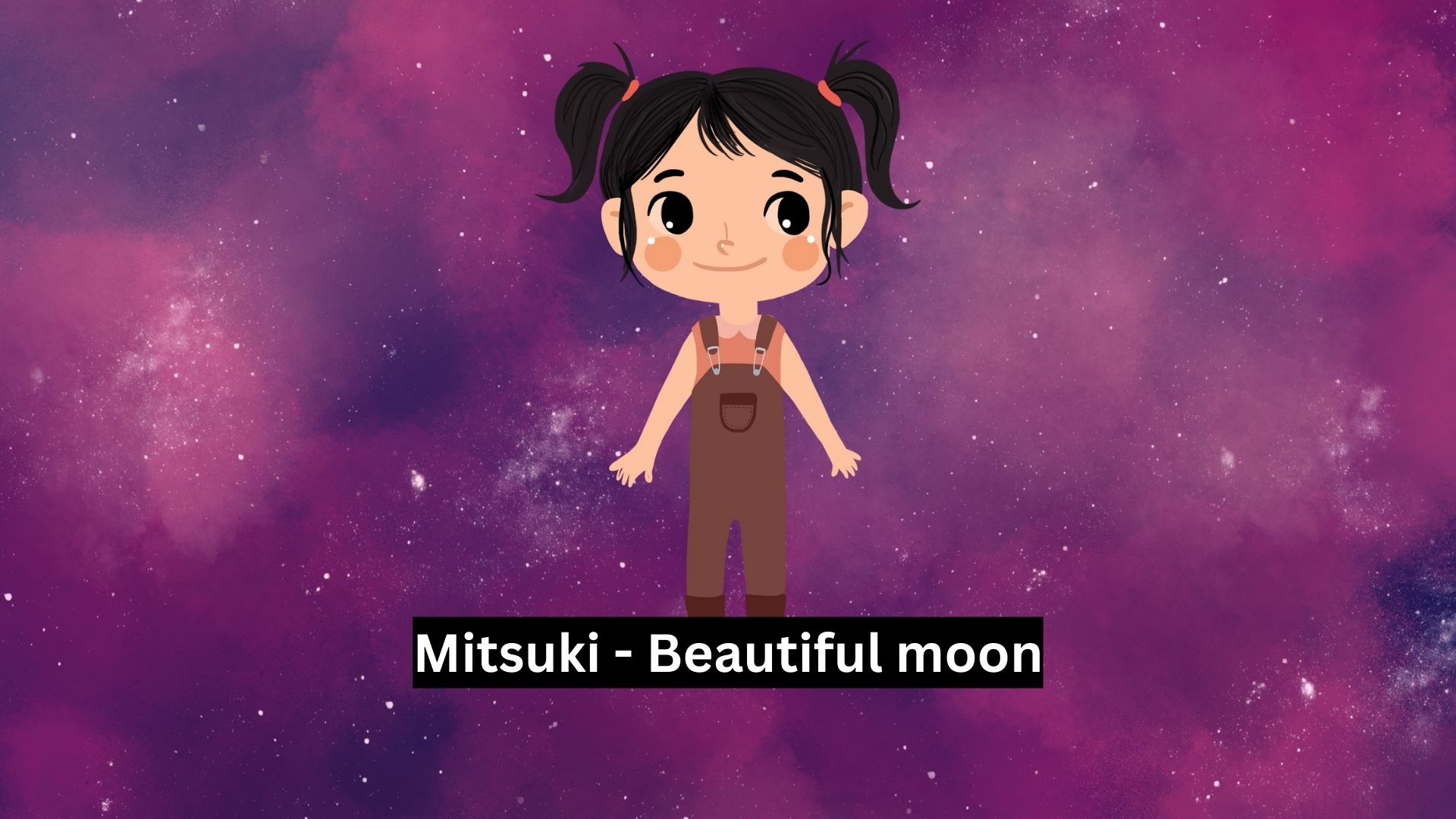
- Akira (明) – Bright, clear: Means bright and clear, like the light of stars.
- Emi (恵美) – Beautiful blessing: Means beautiful blessing, akin to the blessing of a starry night.
- Tsubasa (翼) – Wing: Means wing, suggesting the freedom and expansiveness of the starry sky.

- Hinata (日向) – Sunny place: Means sunny place, evoking warmth and light like that of stars.
- Sakura (桜) – Cherry blossom (star-shaped): Means cherry blossom, whose flowers have a star-like shape.
- Asuka (飛鳥) – Flying bird: Means flying bird, symbolizing the freedom of soaring through a star-filled sky.
- Minori (実り) – Truth, beautiful sky: Means truth and beautiful sky, reflecting the clear and truthful beauty of stars.
- Kohaku (琥珀) – Amber (star-like color): Means amber, a color often associated with the warm glow of stars.
- Misaki (美咲) – Beautiful blossom: Means beautiful blossom, with some flowers resembling stars.
- Haru (春) – Spring: Means spring, a season often associated with renewal and the appearance of stars in clear skies.
- Yuna (優奈) – Gentle, moon: Means gentle and moon, both of which are closely tied to the nighttime sky.
- Aika (愛歌) – Love song: Means love song, echoing the poetic beauty of stars in the night sky.
- Amaya (雨夜) – Night rain: Means night rain, a gentle phenomenon under which stars often peek through.
- Reina (麗奈) – Wise: Means wise, akin to the ancient wisdom and navigation provided by the stars.
- Saki (咲希) – Blossom, hope: Means blossom and hope, reflecting the blossoming of stars in the night sky.
- Haruka (遥) – Distant, far off: Means distant or far off, symbolizing the faraway nature of stars.
- Nao (直) – Honest, straight: Means honest and straight, like the unwavering presence of stars.
- Aya (彩) – Colorful, design: Means colorful and design, reflecting the varied and intricate beauty of constellations.
- Mayu (真夕) – True evening: Means true evening, the time when stars begin to shine.
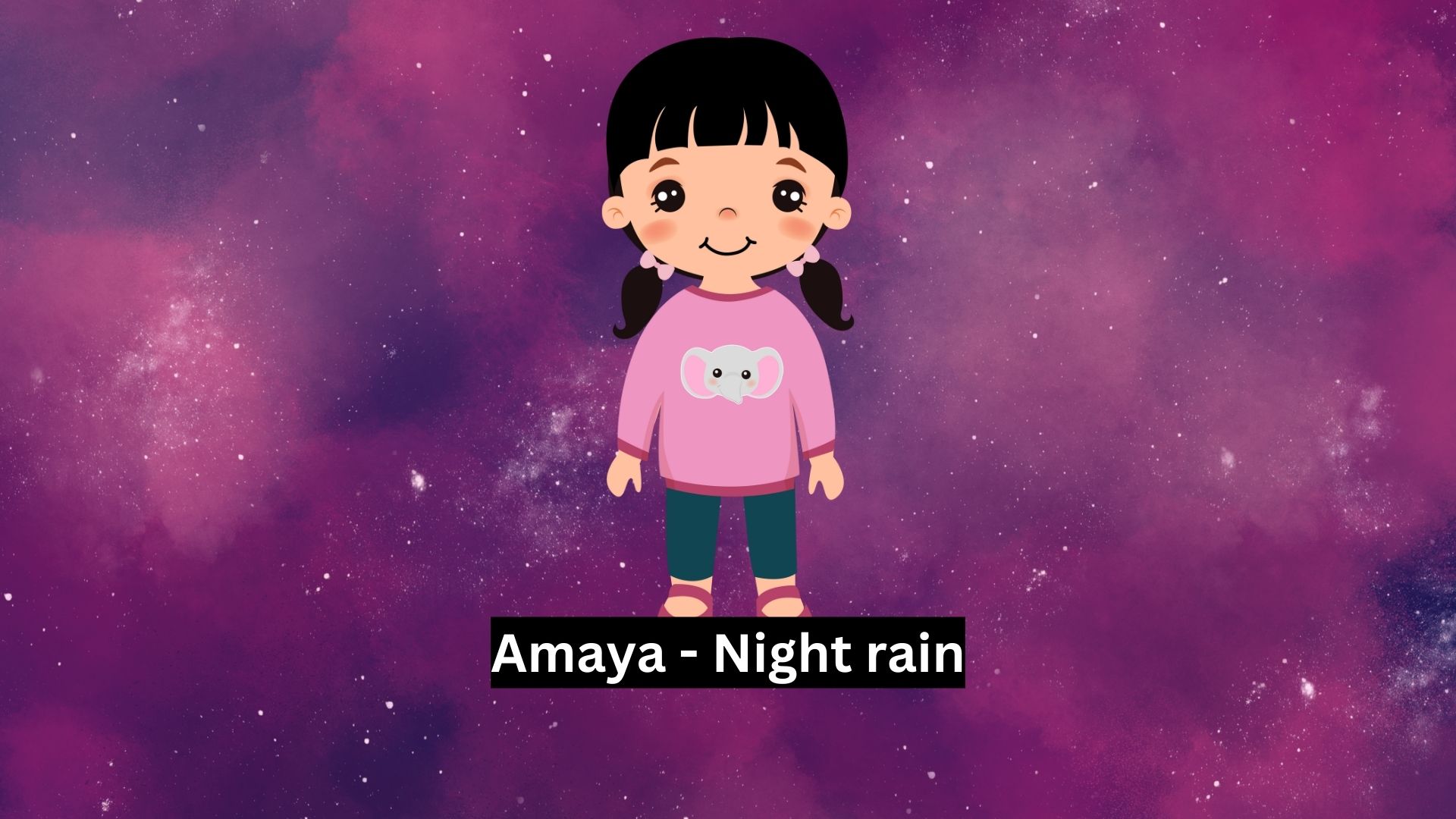
- Riko (莉子) – Jasmine child: Combines “ri” (jasmine) and “ko” (child), with jasmine flowers often star-shaped.
- Shino (竹乃) – Stem of bamboo: Means stem of bamboo, which can resemble the straight, tall presence of stars.
- Nanami (七海) – Seven seas: Means seven seas, hinting at the boundless and expansive nature of the starry sky.
- Shiori (栞) – Bookmark, guide: Means bookmark or guide, much like how stars guide travelers.
- Kaho (香穂) – Fragrant flower: Means fragrant flower, with star-shaped blossoms.
- Mio (美桜) – Beautiful cherry blossom: Means beautiful cherry blossom, whose flowers are often star-shaped.
- Yuka (優花) – Fragrant flower: Means fragrant flower, symbolizing the delicate beauty of stars.
- Hotaru (蛍) – Firefly: Means firefly, small lights that resemble stars in the night.
- Akane (茜) – Deep red: Means deep red, a color often associated with the warm glow of stars.
- Himari (陽葵) – Sunflower: Means sunflower, with flowers that turn towards the sun, like stars in the sky.
- Seina (星菜) – Star vegetables, holy name: Combines “sei” (star) and “na” (vegetables/holy name), symbolizing a sacred connection to stars.
- Tomoe (巴) – Blessing: Means blessing, much like the blessing of a clear, star-filled night.
- Nana (奈々) – Seven: Means seven, a number often significant in star-related myths and stories.
- Miku (美空) – Beautiful sky: Means beautiful sky, the home of the stars.
- Yori (頼) – Trust, reliability: Means trust and reliability, like the constant presence of stars.
- Kirameki (煌めき) – Sparkle, glitter: Means sparkle and glitter, just like the twinkling of stars.
Also Read: 115 Japanese Names That Mean Dragon And Their Meanings
Conclusion
Japanese names meaning ‘star’ really show how much the culture honors the stars and what they stand for. These names, for both boys and girls, are about beauty, uniqueness, and brightness. They reflect important values and a deep respect for the universe. When parents choose these names, they’re giving their kids a legacy of hope and a link to the universe’s beauty. This helps kids grow up with a positive and hopeful view of their future. These names carry hopes and dreams, beauty, and a connection to the cosmos that parents want to share with their children. Keep visiitng The Jeep Diva for more such articles.

Fahmea Shorok is a well-traveled writer who focuses on entertainment journalism. Her work reflects her journeys and showcases her flexible writing style. She explores local art scenes wherever she goes, giving her readers a close look at the entertainment found around the world in theaters, movies, and art galleries.

